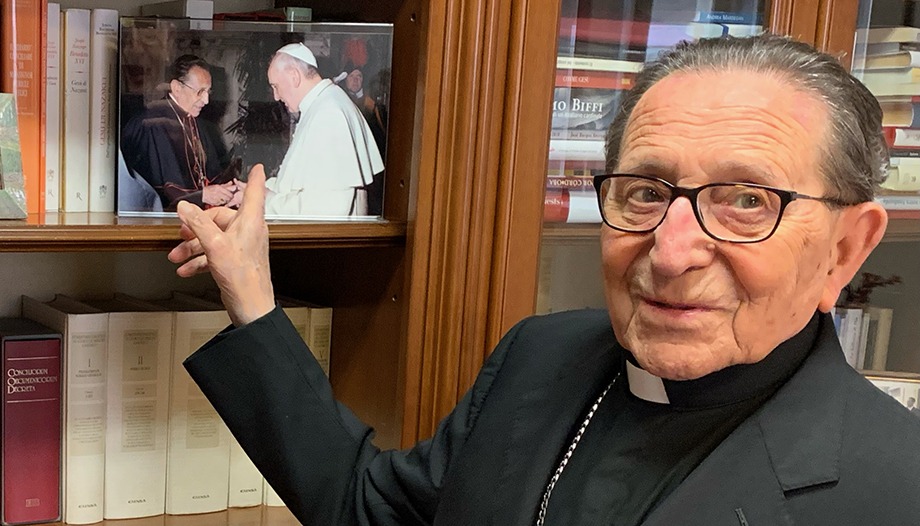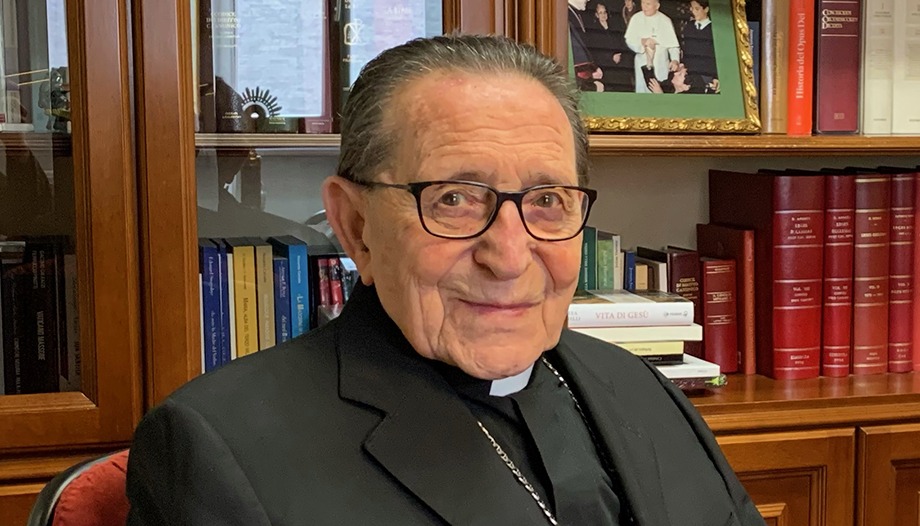Cardinal Julián Herranz began working for the Holy See in 1960. In a previous book he had already collected recollections of the four previous Popes, and now he does the same for Popes Benedict XVI and Francis.
Julián Herranz was created cardinal in 2003, and among his main responsibilities has been that of being president of the Pontifical Council for Legislative Textsand a member of the Disciplinary Commission of the Roman Curia, or assignments such as the investigation of the document leak known as "vatileaks".
You have finished writing a book on Popes Francis and Benedict, how did you approach it?
-Around 2005, when John Paul II died, I had gathered in my personal notes quite a few memories of what I had experienced with the four previous Popes since I began working at the Holy See in 1960. Some of those memories were collected in the book "On the Outskirts of Jericho," which I published in 2007 and which has gone through several editions.
With the argument that personal testimony is worth more than theoretical considerations or intellectual hypotheses, two media professionals and other friends pressed me - despite my age - to write this other book of memories. I have just asked Pope Francis for his permission to publish some of our private correspondence and even notes from audiences, which I have included in the book, as I did with Benedict XVI.
How was your personal relationship with Joseph Ratzinger?
-I have already worked with the cardinal. Ratzinger when he was Prefect of the Congregation for the Doctrine of the Faith and in other bodies of the Curia of which we were both members: the Dicasteries for Bishops and for Evangelization. But above all, in the eight years of his pontificate, when I was President of the Pontifical Council for Legislative Texts and of the Disciplinary Commission of the Roman Curia.
When I reached the age of 80 and, according to the norm of the law, ceased to hold those offices, he asked for my collaboration in various problems and special commissions: the leak of confidential documents in the Holy See (known as "Vatileaks 1"), the study of the Marian phenomenon of Medjugorje, the situation of the Church in the People's Republic of China, and others. It was always a relationship of sincere cordiality and mutual understanding; and on my part of deep respect and veneration as Pope. I suffered when he resigned his pontificate, but I admired that heroic gesture of humility and love for the Church. I have visited him since then at least every Christmas during the ten years of his retired life in the "Mater Ecclesiae" monastery.
How would you qualify, in a few words, his personality and his pontificate?
-What did the Fathers of the Church do in their time, as doctors and pastors? Two fundamental things.
In the first place, to teach how to seek, know and love Christ. This is what Benedict has done, in an evident way with his trilogy "Jesus of Nazareth", showing the identification between the Christ of faith and the Christ of history. And, secondly, to teach how to think and live in a Christian way in the midst of pagan or materialistic societies, highlighting the harmony between reason and faith, with his very rich scientific production and his masterly speeches in the main areopagi of the world (UN, parliament of the United States, England and Germany, universities of Paris, Germany, Spain, Italy...). It seems to me that the simplicity of his manner in the personal encounters collected in the book also corroborates to some extent what I have just said.
And with Pope Francis, how have you maintained personal contact, even recently, since you are over eighty years old and have resigned from your posts in the Curia?
-Francis, like Benedict, has "used" me in spite of my age. He has invited me to lead or be part of some special commissions, and even of a court of appeal on serious crimes of the clergy. And he has asked for my personal opinion on various questions. He was very amused at a consistory or meeting of cardinals in which, citing that juridical norm of 80 years of age, I jokingly called it "canonical euthanasia".
Is there continuity between the pontificates of Pope Benedict and Pope Francis?
-In my opinion -which does not prejudge that of the book's readers- there is an underlying continuity, although some deny it.
I believe it is necessary to distinguish two expressions: "contrast" and "integrate". Both the German Benedict and the Argentinean Francis are influenced by one of the most important intellectuals of the 20th century, Romano Guardini, who distinguishes between "opposition" and "polarization".
But I think it is the direct action of the Holy Spirit that is ensuring that there is continuity in the two pontificates. I would say that they are diverse and at the same time complementary. There are differences between the Popes, in their personalities, in their cultural roots, in their pastoral experiences; but these differences - in language, in the way of relating to the media, in lifestyle, etc. - in my opinion do not generate opposition, but harmony. They are a manifestation of the very catholicity of the Church and of the universality of the one Gospel of Christ. The Gospel is like a "divine diamond," and in each pontificate the Holy Spirit illuminates one or another facet, without excluding the others. In the pontificate of Benedict, faith and truth shine against the dictatorship of relativism; in the pontificate of Francis, the practice of the "mandatum novum", of love of neighbor, especially of the poorest and most needy.
But not a few voices, including those of some cardinals, allude to substantial differences in evangelical doctrine between the two pontificates....
-I do not judge any of these interventions and even less the rectitude of intention of these brothers of mine. My opinion is different, and - don't laugh - not because, at 92 years of age, I am trying to make a "career" out of flattering the Pope. The three cardinals that Benedict XVI chose for the commission called "Vatileaks" did not "pretend" to do so either.
No. I do not see these differences in evangelical doctrine (that is, in the "depositum fidei"). The difference in the content or pastoral priority of one pontificate and the other is evident. Benedict put the accent on Faith, Francis on Charity; Benedict on Truth, Francis on Love; Benedict on the "vertical" dimension of the Gospel, worship and love of God, Francis on the "horizontal" dimension, service and love of neighbor. But it is obvious - over and above any ideological or political-financial manipulation - that between these different projects or pastoral guidelines there is no contradiction or opposition, but harmony and complementarity.

Apart from this assessment of his pontificate, what personal relationship have you had with Francis, now that he does not hold positions in the Curia?
-Although the relationship was previous, I can say that I really got to know the Cardinal Archbishop of Buenos Aires in the General Congregations and other meetings that preceded the conclaves of 2005 (election of Benedict XVI) and 2013, in which Jorge Mario Bergoglio became Pope Francis, and to whose difficult pre-congclave I dedicate a chapter of the book. But also in these ten years of his pontificate and exemplary coexistence with Benedict we have had frequent contacts, institutional or otherwise.
By "institutional" I mean consistories and other meetings of cardinals with the Pope. And "non-institutional"?
-With both Benedict and Francis I have tried to follow two principles of conduct. As a cardinal I have the right and duty to say to the Pope whatever, in conscience, meditated on in prayer, I judge necessary or of any use as an aid in his difficult ministry.
But it is fair that he does it loyally (by word of mouth or in writing, "to his face", as they say) and humbly (with "garbage can option"), not pretending to be right or to give lessons. There are examples of this way of proceeding in the book. With Francisco, above all, there has been abundant private correspondence. A part of it will be published in the book, for which I have requested the Pope's permission.
Francis has shown me undeserved trust, not only with proofs of fraternal friendship but also by calling me to examine, personally or in commissions, problems of government (serious sexual crimes or administrative corruption, reform of the Roman Curia, serious crisis situations in certain religious congregations...).
In the book, you deal with the friendship between the two Popes. Some have said that the Pope Emeritus did not agree with Francis' decisions. What did Benedict think of Francis?
-After his resignation I visited him, and logically we discussed the life of the Church. Benedict spoke freely with me, he didn't need half-words, and I never heard him make negative comments or judgments about Pope Francis. What did he think? I don't pretend to know his thoughts. Speaking on one of these visits about the embrace between the two Popes at the opening of the Holy Year of Mercy, he confided to me that he was happy to see how much affection and sympathy Francis aroused among the people. He told me: "That makes me happy and gives me peace".
Do your memories of dealing and working with two such different Popes also manifest "from the inside," shall we say, some form of direct involvement in the study of significant problems?
-Yes, of necessity. That is why, as I have already told you, I had to dedicate some chapters to the Lefebvre movement, to the commission called "Vatileaks", to the Mariological phenomenon of Medjugorje, to the reform of the Curia .... and the same to the context of the manifesto of the ex-nuncio Viganó and other attacks on Francis. I don't know if he will like everything I say... At some point I don't think so. But he knows that I try to be sincere, and I dared to ask him for a prologue for the book.









